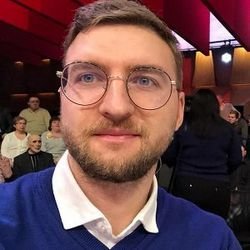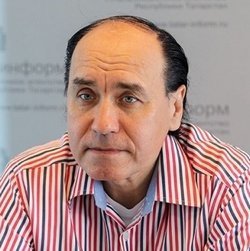To keep zen in coronavirus era: tips from specialists
How not to succumb to the general coronavirus-related hysteria and try to keep the mental balance
The COVID-19 pandemic has a bad impact not only on people’s physical but also mental health. Read in Realnoe Vremya’s report on how to stay mentally healthy during the worldwide hysteria, why husband and wife begin quarrelling, how to read the mass media and social networks in the right way and why it’s important to entertain yourself correctly.
To hit stress with entertainment
A famous psychologist for anxieties, Candidate for Sciences, writer and blogger Pavel Zhavnerov agrees that the COVID-19 pandemic and, of course, the negative news linked with this topic make most people more anxious.
“A person’s degree of anxiety is always determined by the number of anxious events in his life,” the expert explained. “So everybody’s anxiety is growing during the pandemic. It is also a fear that a person will contract coronavirus and when the pandemic will end, and how it will influence the economy, incomes, his relatives. Many are finding it tough here, especially those who were on the edge, about suffering neuroses, panic attacks — aggravations take place. Such people could withstand another year or a few months, but this process speeds up because of a big number of anxious events.”

“If a person goes out, and it is cold there, he feels uncomfortable, the wind is blowing on his face, and this happens every day — his general physical well-being gets worse. Emotions always heighten at this moment, which means anxiety does too.”
The psychologist thinks that mainly those whom such a state impedes from leading a normal life resort to specialists. While most people don’t need it: all their worries will go away as soon as the situation with the pandemic becomes normal.
As a self-care in the current circumstances, Pavel Zhavnerov advises distracting from anxious thoughts and find several ways of entertainment.
“I would advise any person to find several new entertainments, some 3-5. For many, it will be enough to look for something they like, something they can do staying home
“The main problem people have is when they have free time they even don’t know what to do. They got used to doing what they have to do. But as soon as they don’t need to do something, they are simply lost because they simply don’t know how to entertain themselves,” the psychologist says. “I would advise any person to find several new entertainments, some 3-5. For many, it will be enough to look for something they like, something they can do staying home — do stretching, watch favourite films, order new interesting food or use a new service, subscribe for new series. One should wait out this time by making up additional entertainments that balance the accumulated stress. Not to stay in it all the time but compensate for a rise in stress with a big number of entertainments for yourself.”
“Many simply headed to Turkey from this gloominess”

“As a rule, patients with depression have more significant reasons and mechanisms of such a state than coronavirus. My patients with depression are so critical that it is just some cosmetics for them. It was already noted a long time ago that this coronavirus, in contrast, can be a joy for a person with schizophrenia suffering from depression. Such patients often focus on inoffensive things but simply may not see dangerous things,” he explained.
The docent is convinced that autumn in itself exacerbates depressive states. And if many would cope with it on their own in the past, the period of restrictions has heavily decreased the number of ways to fight the blues. Mass events, concerts, theatre, crowded meetings usually work well to improve one’s mood, it is an excellent way of self-expression. Now the range of these opportunities is much smaller than usual. The psychologist also notes that somebody simply used to go to warm countries:
“Many simply headed to Turkey from this gloominess during this depression. A gigantic army would go to the sun in October and November.”
Mass events, concerts, theatre, crowded meetings usually work well to improve one’s mood, it is an excellent way of self-expression. Now the range of these opportunities is much smaller than usual
“Don’t read Soviet newspapers” and don’t irritate people around you
Garifullin considers that people feel chronic non-freedom during coronavirus restrictions.
“This factor kills dreams. While a dream even if it doesn’t come true is a value in itself. Even if he doesn’t make this dream true but he is simply free and dreams. A person finds it is easier to live in such a situation. For instance, the person didn’t even plan to fly somewhere but realises that if he has such an opportunity, it warms him. While now non-freedom, the cell, fear for the health and economic hardships are pressing him because many are simply afraid to lose their job,” he complained.
Ramil Garifullin advises our readers, first of all, to focus on the perception of those things that make us happy. It is also necessary to objectively evaluate the pressure from the mass media, which the psychologist considers creates high ratings with the help of fears and phobias. The expert advises turning on logic and considering the reality without bias.
“There is such an occurrence as coronavirusphobia. It blossomed in spring, but now as there is an army of people who recovered from it, this occurrence is going away. There is even a lot of people who want to fall ill faster not to expect this problem. So now coronavirusphobia has decreased a bit,” he says. The KFU docent said he wrote texts in spring to reduce coronavirusphobia, and people thanked him for this.
“But this doesn’t mean that one shouldn’t wear a mask, take other preventive measures. Now it is important to filter information, develop intelligence and logic for the objective perception of the reality. It is important to respect society — to wear a mask. It is important to behave correctly, understand that the people is irritated. If you enter a public space, put a mask on not to irritate people around,” he advises.
Now it is important to filter information, develop intelligence and logic for the objective perception of the reality. It is important to respect society — to wear a mask. It is important to behave correctly, understand that the people is irritated
According to Ramil Garifullin, it is also important to sort out those values that improve your mood. He pays attention to the fact that nobody has so far cancelled the sky, sun and nature, communication also remains permitted, in the end, one can communicate in social networks too. And the sun hasn’t disappeared — it is out there, simply hidden behind the clouds.
The interlocutor of our newspaper urges us not to shift all our problems to coronavirus:
“You can’t escape from yourself. One shouldn’t blame coronavirus for everything bad that’s happening to you. You should solve problems with your psychology, find conditions for self-expression. Do at least breathing exercises. One can dedicate oneself to films, art, some person. There is no room for black thoughts in the meantime. Learn how to hypnotise yourself, devote to something that’s outside you. Improve your sleep, make it better, with a smile on your face!”
Coronavirus psychoses and family scandals
Psychiatrist of one of the Moscow hospitals, private psychotherapist Sergey Shershevsky confirms in a talk with Realnoe Vremya’s correspondent that the general level of stress significantly increased during the coronavirus pandemic. “Borderline states began to worsen, first of all, because of this,” the expert says.

“Simply more patients with coronavirus infection began to be brought. We regularly diagnose them. But the course of mental disorders in them doesn’t significantly differ from some others. Moreover, mainly old people with coronavirus come here. They have senile psychoses, dementia, Alzheimer’s and so on. Neither I nor my colleagues have seen a big difference in the course of disorders,” the doctor says.
As for private psychotherapeutic practice, Sergey Shereshevsky notices that couples have begun to turn to him more often. The issue became especially topical during the period of introduction of the self-isolation regime when most families literally stuck in their own flats.
“When people get married, they mainly interact in the morning, in the evening and at weekends. In other words, they kissed in the morning, had sex in the evening, watched TV and went to a park at the weekend. They gave birth to a baby — nothing changes, just the child builds in this regime. And here, the mom and dad are sitting and looking at each others’ quite annoyed faces,” he described one of many analogous cases of his today’s practice.
The specialist says it is one thing when the spouses spent the night together and meet in the morning and the evening in front of the TV for a while.
As it turned out, couples often don’t know how to spend time together when it isn’t regulated
“When they turn out literally locked inside and have to spend a lot of time together, it often appears that they are completely unready for this. So visits in family psychotherapy have increased,” he said. “As it turned out, couples often don’t know how to spend time together when it isn’t regulated. If the spouses go on holiday, as a rule, there is a plan — the sea, riding a bicycle, excursions, so decisions are made for them, while they simply obey the ready order. And in the new conditions, it turned out that they have to create this order themselves. And not everybody can do this. And these orders need to be approved because women have their orders, while men — others,” the psychotherapist explains.
Sergey Shereshevsky concludes that in isolation the spouses turned out in a completely unusual situation with a person they got out of the practice of interacting, moreover, they aren’t used to considering each others’ needs.
“It is necessary to turn our brain on”
Sergey Shereshevsky also gave Realnoe Vremya’s readers recommendations that will help not to succumb to the coronavirus hysteria. First of all, the expert considers that it is necessary to work on one’s education.
“In the current situation, it is often hard to sort out the wheat from the chaff. But you choose yourself: to watch Malysheva on Channel One or surf the Net and look for comments of, for instance, the head of Reanimation of some Moscow hospital, read Denis Protsenko (Editor’s Note: chief doctor of the Kommunarka hospital) to understand what they are talking about,” he is convinced. “Of course, the next infringement on civic liberties can be seen in mask wearing, but on the other hand, it is completely necessary things. So it is at least not sensible to criticise all measures the current authorities are offering. There is a real battle on the Internet amid this.”

In the current situation, it is often hard to sort out the wheat from the chaff. But you choose yourself: to watch Malysheva on Channel One or surf the Net and look for comments of, for instance, the head of Reanimation of some Moscow hospital
The expert is urging everybody to turn their brain on when processing information in the mass media:
“The total literacy if we determine literacy as a capability of reading words has led to curious consequences. An average person (regardless of his place of residence, I will note!) is bad at meanings, doesn’t understand what he reads. This can be easily explained — as a rule, people response to some markers that simplify the perception of a text. But the problem is that it is spreading to all spheres of life. Since propaganda became ‘our everything’, which happened as early as 1917, the trust in a word in a newspaper and later on TV began to be inculcated in our population, like a newspaper won’t lie. This leads to the loss of a critical attitude to what surrounds us. And the absence of criticism is a hint of a mental disorder,” the doctor concludes.